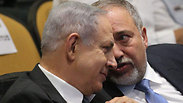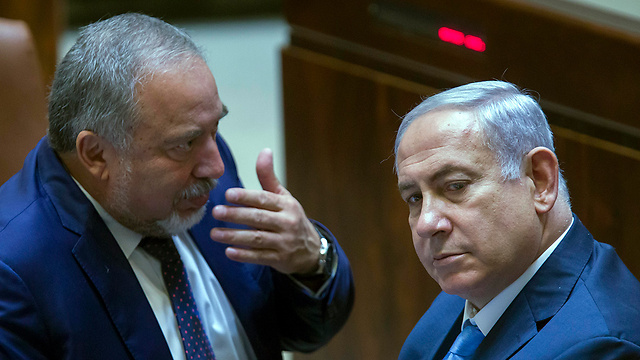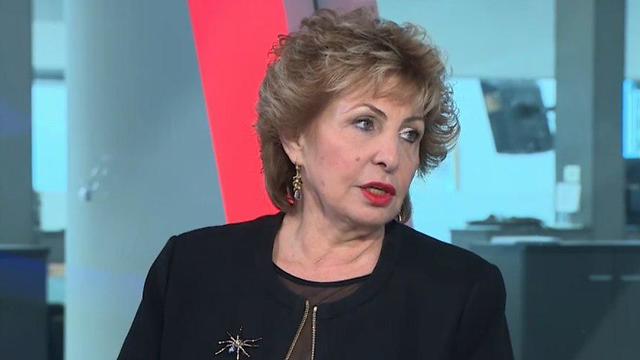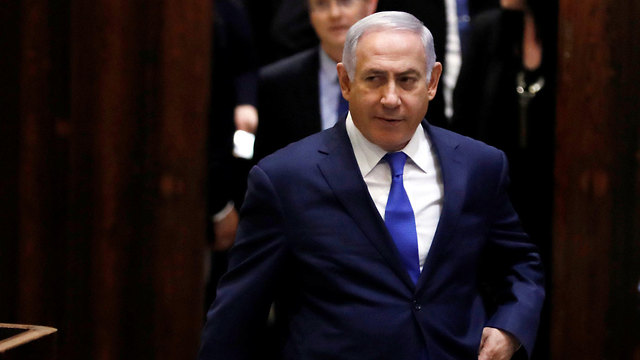

Coalition members accuse Netanyahu, Lieberman of coordinating crisis
'This is Netanyahu's window of opportunity to go to elections under the title suspect rather than defendant,' one coalition official accuses; 'Lieberman gave Netanyahu the reason to go to elections,' says a Likud official. 'Each will blame the other, and both will gain.'
Senior coalition members harshly criticized Prime Minister Benjamin Netanyahu and Defense Minister Avigdor Lieberman on Monday night, asserting the two are working together to call early elections.
The two politicians are expected to meet again on Tuesday in an effort to resolve the crisis, but at present it appears Lieberman remains firm in his position.
One official called the crisis, which erupted over Haredi parties' insistence to pass an amendment to the IDF draft law that would solicit state recognition of Torah studies to being equal to military service, a "fake crisis."
"This is Netanyahu's window of opportunity to go to elections under the title 'suspect' rather than 'defendant,'" the official said. "The resuscitation attempts of this coalition are artificial. Netanyahu is working on a date for the elections, not a compromise."
Netanyahu did reach a compromise with Haredi parties, who initially threatened not to support the 2019 state budget if their bill is not passed in second and third reading before the Knesset's winter session's conclusion on March 18, convincing them to instead settle for a preliminary reading vote—a compromise Lieberman rejected.
Lieberman, who is a minister but not a member of Knesset, said his Yisrael Beytenu party will vote against the legislation in its preliminary reading as well as in the second and third readings, which are scheduled to take place in May.
Immigration and Absorption Minister Sofa Landver, who appealed the legislation on behalf of the Yisrael Beytenu party, is supposed to vote against it in the Knesset.
Netanyahu could choose to either fire her for breaking coalition discipline or to swallow the bitter pill. Had Landver voted against a government-sponsored bill proposal, she would no doubt have been fired. But since the bill proposal is a private one, Netanyahu has some leeway and doesn't have to fire her.
If the prime minister does fire Landver, Lieberman and his party's MKs are expected to resign from the government and the Knesset, leaving the prime minister with a narrow coalition that only has a one-vote majority, something Netanyahu doesn't want.
"A government that relies on a one-vote majority simply cannot function. We've been there; we've seen what it's like. That is why we expended the government," he said on Monday.
Netanyahu is therefore expected to announce the dissolvement of the Knesset and set his preferred date for the elections: June 26.
The Ministerial Committee for Legislation is due to meet Tuesday to discuss Yisrael Beytenu's appeal against the draft law amendment. Landver, who will land at Ben-Gurion Airport at 2pm after a few days abroad, will head straight to the Knesset to explain the reasons behind the appeal.
After the Ministerial Committee for Legislation rejects the Yisrael Beytenu appeal, the legislation will be brought to a preliminary reading at the Knesset plenum.
Knesset Speaker Yuli Edelstein has also approved to raise to a vote a proposal to dissolve the Knesset, which was submitted by members of the opposition. If passed, the elections for the 21st Knesset will take place within 90 days
On the surface, Lieberman has nothing to gain from going to elections, but coalition officials claimed on Monday that he is not the one paving the way to the polls.
"Netanyahu wanted elections, and Netanyahu arranged elections for himself," a coalition official explained. "These are personal elections that no one in the government or Knesset wants."
A Likud official, meanwhile, raised the suspicion Lieberman and Netanyahu were coordinated. "Lieberman gave Netanyahu the reason to go to elections. It looks like they're too coordinated. Each will blame the other, and both will gain. Bibi will say it's not his fault, and Lieberman will have an achievement to present to his voters: I didn't capitulate to the Haredim."
Others in the coalition also claimed the defense minister and the prime minister were working together. "Lieberman has no interest in going to elections because he can't get ahead in the polls. Despite that he played right into Bibi's hands and helped him bring to early elections," a coalition official said, using Netanyahu's nickname. "There is no other explanation to this unless they are coordinated and Lieberman already has a spot reserved in Bibi's next government."
While Netanyahu called on Lieberman on Monday to make a "supreme effort" to save the government and reach a compromise, coalition members were not impressed. "Instead of sitting down with Lieberman and trying to resolve the crisis, Netanyahu sat down with Knesset Speaker Yuli Edelstein to plan the early elections," one coalition member said. "Netanyahu's words at the podium were an act."
Lieberman, meanwhile, rejected all of these claims.
While most coalition officials spoke anonymously, Justice Minister Ayelet Shaked had no qualms with publicly pointing a finger at Netanyahu. "This is an artificial crisis," she tweeted. "Prime Minister, bringing down a right-wing government over nothing at all would be a historic mistake, similar in its impact to the collapse of the Shamir government in 1992."
Polls: Netanyahu would retain power, Lieberman won't fare well
Indeed, polls released by Channel 2 News and Channel 10 on Monday evening showed Lieberman's party will not fare well if elections were held now, while Netanyahu's Likud party is expected to retain its power.
A Channel 2 poll by Dr. Mina Tzemach and Mano Geva found the Likud party would win 30 out of the Knesset's 120 seats, the same as what it currently has. Yesh Atid would jump from 11 seats to 21; Zionist Union, a joint effort by the Labor and Hatnua parties, will lose 9 of its current seats, dropping to 13.
Meanwhile, the Arab Joint List party would retain its 13 seats; Naftali Bennett's Bayit Yehudi would rise from 8 to 11; Meretz would gain two seats, bringing it up to 7; United Torah Judaism would go up one seat to 7, and Moshe Kahlon's Kulanu would drop from 10 to 6.
The underdog of this election appears to be Orly Levy-Abekasis, who left Lieberman's Yisrael Beytenu party and announced she was starting a new party. That party—which doesn't have a name, an official platform or, indeed, members—is expected to get five seats.
Lieberman's party and Shas are at risk of falling short of the Knesset threshold, and would get four seats each. Meanwhile former Shas member Eli Yishai and former Likud member Moshe Ya'alon don't appear to be passing the threshold at all.
Channel 10's polls did not take Levy-Abekasis into account, giving Yisrael Beytenu 6 seats. Meanwhile, Likud would drop one seat to 29, Yesh Atid would climb to 24, the Joint List would remain at 13, Zionist Union would drop to 11, Bayit Yehudi would rise to 11, Meretz would soar to nine, while Kulanu would drop to 6. United Torah Judaism would remain at 6, while Shas would drop to 5.


















